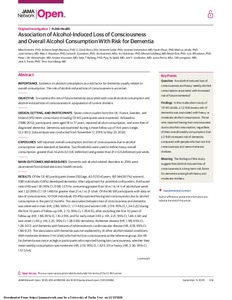Association of Alcohol-Induced Loss of Consciousness and Overall Alcohol Consumption With Risk for Dementia
Mika Kivimäki; Archana Singh-Manoux; G. David Batty; Séverine Sabia; Andrew Sommerlad; Sarah Floud; Markus Jokela; Jussi Vahtera; May A. Beydoun; Sakari B. Suominen; Aki Koskinen; Ari Väänänen; Marcel Goldberg; Marie Zins; Lars Alfredsson; Peter J. M. Westerholm; Anders Knutsson; Solja T. Nyberg; Pyry N. Sipilä; Joni V. Lindbohm; Jaana Pentti; Gill Livingston; Jane E. Ferrie; Timo Strandberg
Association of Alcohol-Induced Loss of Consciousness and Overall Alcohol Consumption With Risk for Dementia
Mika Kivimäki
Archana Singh-Manoux
G. David Batty
Séverine Sabia
Andrew Sommerlad
Sarah Floud
Markus Jokela
Jussi Vahtera
May A. Beydoun
Sakari B. Suominen
Aki Koskinen
Ari Väänänen
Marcel Goldberg
Marie Zins
Lars Alfredsson
Peter J. M. Westerholm
Anders Knutsson
Solja T. Nyberg
Pyry N. Sipilä
Joni V. Lindbohm
Jaana Pentti
Gill Livingston
Jane E. Ferrie
Timo Strandberg
AMER MEDICAL ASSOC
Julkaisun pysyvä osoite on:
https://urn.fi/URN:NBN:fi-fe2021042823173
https://urn.fi/URN:NBN:fi-fe2021042823173
Tiivistelmä
This cohort study examines the association of overall consumption of alcohol and resultant loss of consciousness with risk for dementia.Question Are alcohol-induced loss of consciousness and heavy weekly alcohol consumption associated with increased risk of future dementia? Findings In this multicohort study of 131x202f;415 adults, a 1.2-fold excess risk of dementia was associated with heavy vs moderate alcohol consumption. Those who reported having lost consciousness due to alcohol consumption, regardless of their overall weekly consumption, had a 2-fold increased risk of dementia compared with people who had not lost consciousness and were moderate drinkers. Meaning The findings of this study suggest that alcohol-induced loss of consciousness is a long-term risk factor for dementia among both heavy and moderate drinkers.Importance Evidence on alcohol consumption as a risk factor for dementia usually relates to overall consumption. The role of alcohol-induced loss of consciousness is uncertain. Objective To examine the risk of future dementia associated with overall alcohol consumption and alcohol-induced loss of consciousness in a population of current drinkers. Design, Setting, and Participants Seven cohort studies from the UK, France, Sweden, and Finland (IPD-Work consortium) including 131x202f;415 participants were examined. At baseline (1986-2012), participants were aged 18 to 77 years, reported alcohol consumption, and were free of diagnosed dementia. Dementia was examined during a mean follow-up of 14.4 years (range, 12.3-30.1). Data analysis was conducted from November 17, 2019, to May 23, 2020. Exposures Self-reported overall consumption and loss of consciousness due to alcohol consumption were assessed at baseline. Two thresholds were used to define heavy overall consumption: greater than 14 units (U) (UK definition) and greater than 21 U (US definition) per week. Main Outcomes and Measures Dementia and alcohol-related disorders to 2016 were ascertained from linked electronic health records. Results Of the 131x202f;415 participants (mean [SD] age, 43.0 [10.4] years; 80x202f;344 [61.1%] women), 1081 individuals (0.8%) developed dementia. After adjustment for potential confounders, the hazard ratio (HR) was 1.16 (95% CI, 0.98-1.37) for consuming greater than 14 vs 1 to 14 U of alcohol per week and 1.22 (95% CI, 1.01-1.48) for greater than 21 vs 1 to 21 U/wk. Of the 96x202f;591 participants with data on loss of consciousness, 10x202f;004 individuals (10.4%) reported having lost consciousness due to alcohol consumption in the past 12 months. The association between loss of consciousness and dementia was observed in men (HR, 2.86; 95% CI, 1.77-4.63) and women (HR, 2.09; 95% CI, 1.34-3.25) during the first 10 years of follow-up (HR, 2.72; 95% CI, 1.78-4.15), after excluding the first 10 years of follow-up (HR, 1.86; 95% CI, 1.16-2.99), and for early-onset (<65 y: HR, 2.21; 95% CI, 1.46-3.34) and late-onset (>= 65 y: HR, 2.25; 95% CI, 1.38-3.66) dementia, Alzheimer disease (HR, 1.98; 95% CI, 1.28-3.07), and dementia with features of atherosclerotic cardiovascular disease (HR, 4.18; 95% CI, 1.86-9.37). The association with dementia was not explained by 14 other alcohol-related conditions. With moderate drinkers (1-14 U/wk) who had not lost consciousness as the reference group, the HR for dementia was twice as high in participants who reported having lost consciousness, whether their mean weekly consumption was moderate (HR, 2.19; 95% CI, 1.42-3.37) or heavy (HR, 2.36; 95% CI, 1.57-3.54). Conclusions and Relevance The findings of this study suggest that alcohol-induced loss of consciousness, irrespective of overall alcohol consumption, is associated with a subsequent increase in the risk of dementia.
Kokoelmat
- Rinnakkaistallenteet [29335]
